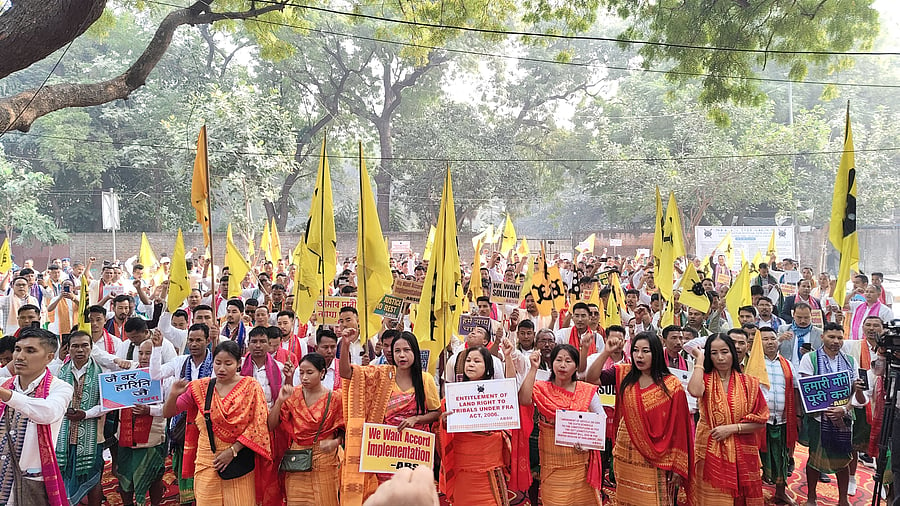
Protesters at Jantar Mantar in New Delhi on Friday (November 21). Credit: ABSU
Nearly five years after signing the new Bodoland Accord with the government to end the problems including militancy in Assam's Bodoland region, the signatories on Friday took to the streets at Jantar Mantar in New Delhi demanding its full implementation.
The sit-in demonstration was staged by All Bodo Students' Union (ABSU), Ex-NDFB Welfare Association and United Boro People's Organisation (UBPO), the three signatories, as part of their two-day-long agitation in the national capital.
Those who staged the demonstration said that several key commitments of the new accord remained unfulfilled in the past five years.
The protest was staged weeks after UPPL, an ally of BJP in Bodoland and Assam government, lost the BTC elections to Bodoland People's Front (BPF).
Credit: ABSU.
"The Bodo Accord of 2020 brought a new dawn of peace and stability to the Bodoland region, but peace must be backed by action. For five years, we have waited with patience and faith, yet several key clauses of the Accord remain untouched. If the commitments made by the Government of India are not fulfilled on time, the very credibility of the Accord comes into question. The Bodo people have upheld their part of the promise by maintaining peace—we now expect the government to uphold theirs with sincerity, urgency and respect," said ABSU president Dipen Boro.
Some of the major unfulfilled clauses are: passage of the 125th (Constitution) Amendment Bill, 2019, revising Article 280 and the Sixth Schedule to enhance financial autonomy and administrative powers of Bodoland Territorial Council (BTC) and other councils, increase BTC constituencies from 40 to 60 without affecting tribal reservation, direct funding through Article 280 and Article 275(1)(a), granting of ST (Hill) status to Bodo-Kachari people in Karbi Anglong and Dima Hasao as per BTC Accord 2003 and BTR Accord 2020, provincialisation of schools and colleges within BTR and Bodo-medium institutions outside BTR, land rights for tribal communities as per the Forest Rights Act, 2006, withdrawal of pending cases and release of remaining Ex-NDFB members, along with ex-gratia for martyr families, beside others.
Peace returned to Bodoland region after all four factions of NDFB, now a disbanded insurgent group, laid down their weapons and joined the mainstream.
Change of guard in BTC:
The protest was staged weeks after UPPL, an ally of BJP in Bodoland and Assam government, lost the BTC elections to Bodoland People's Front (BPF).
Many former members and leaders of NDFB and ABSU had joined the UPPL and formed the Bodoland Territorial Council in 2021. But it's defeat this time to BPF has now raised doubt about the future of the 2020 Accord. BPF, which recently was re-inducted into the NDA and Assam government, is non-commital about the 2020 Accord. BPF, led by present BTC chief Hagrama Mohilary, a former insurgent leader, had signed a similar Bodoland Accord in 2003 and joined the mainstream. Hagrama recently said1 his party is committed for implementation of the 2003 Accord only.
ABSU demanded tripartite talks for full implementation of the 2020 Accord.